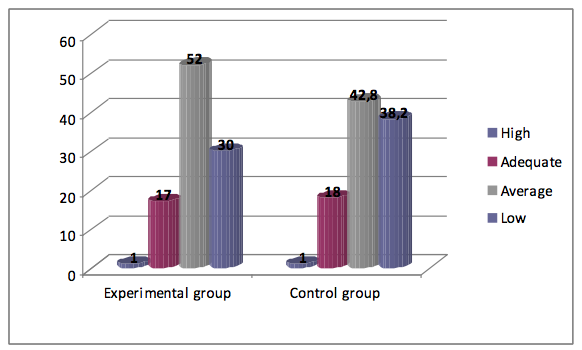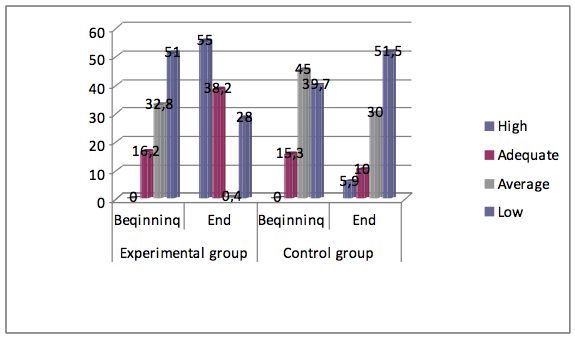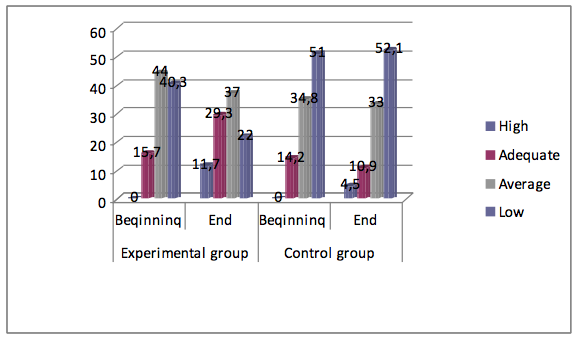

 Vol. 39 (Number 35) Year 2018. Page 18
Vol. 39 (Number 35) Year 2018. Page 18
Danabek POSHAEV 1; Baktiyar ORTAYEV 2; Sabira ALIMBEKOVA 3; Аliya KURALBAYEVA 4; , Batyrkhan AUEZOV 5
Received: 17/03/2018 • Approved: 01/05/2018
ABSTRACT: In the "Strategy "Kazakhstan-2050"- new political course held state", actualizing the issues related to the problems of formation of national consciousness among the youth in the designated perspective, focuses on the fact that there is a necessary condition for building a civilized way, in the nearest future, the Strong Powerful and Kazakh state. This can be achieved by maintaining the cultural code (language, spirituality, traditions) of the nation. Therefore, these components need to be taken as an integral part of the consciousness of modern man and the meaning of modern education. In this regard, in the process of education and training of young people it is necessary, firstly, to take into account the global changes occurring in the world and, secondly, to pay special attention to the deep study of national, cultural-historical and social and economic status of people. Hence the education of the individual student conscious possessing human and national values is an urgent modern problem today. |
RESUMEN: En la nueva "Estrategia" Kazajstán-2050 " el curso político se mantuvo en el Estado, actualizando los problemas relacionados con los problemas de la formación de la conciencia nacional entre los jóvenes en la perspectiva designada, se centra en el hecho de que hay una condición necesaria para construir un forma civilizada, en el futuro más cercano, el Estado Fuerte Poderoso y kazajo. Esto se puede lograr manteniendo el código cultural (idioma, espiritualidad, tradiciones) de la nación. Por lo tanto, estos componentes deben tomarse como parte integral de la conciencia del hombre moderno y del significado de la educación moderna. En este sentido, en el proceso de educación y formación de los jóvenes es necesario, en primer lugar, tener en cuenta los cambios globales que se producen en el mundo y, en segundo lugar, prestar especial atención al estudio profundo de los valores nacionales, histórico-culturales y culturales. estado social y económico de las personas. Por lo tanto, la educación de los estudiantes conscientes que poseen valores humanos y nacionales es un problema moderno urgente en la actualidad. |
National self-consciousness individual expresses an idea of national identity, the relationship to the historical past of the nation, its present and future, the study of national culture, awareness and acceptance of national interests and values.
In the context of happening process responsibility of educational institutions of society is increased, particularly- a comprehensive school in formation the personality of the growing generation of change. Hence, one of the major challenges at the present stage in front of pedagogical theory and practice in the education of the younger generation is the problem of the formation of the national philosophy of modern students.
From this perspective, the organization of the educational process to continue education should be implemented according to national circumstances and fill the gap in educational content "national special" component, because only in this case we can speak of the formation of national identity, national feeling, and national character of personality.
Studies are being carried out in several stages , by definition, scientific and methodological basis for the formation of learning content in the context of culture, including : foundations of the culture in the content and process of education; basic principles of forming a national model of learning content; didactical conditions, methods and forms of implementation and substantive and procedural aspects of learning in the context of culture in the system of continual education; methodical conditions to ensure effective formation of the national outlook of pupils by means of folklore.
In this aspect, at the first phase, it becomes extremely important to use huge pedagogical possibilities of musical art.
In this regard, research has been focused to the influence of folk music on the formation of the concept of "outlook of world" as well as the role of the formation of the ancient, world view of all mankind (Ahtanov C.).
Basics of outlook is laid in the primary class and slightly formed in adulthood. To do this, first of all mastering the fundamentals of knowledge in the context of culture is needed and on their basis national culture is formed (D. Poshaev) as it is a combination of characteristic sensitivity to individual nations, ethnicities. For forming the outlook in children’s mind has very important physical and spiritual education. And, for the development of the second a rich musical art of Kazakh people has great influence.
Consequently, the music of art is as a means aimed at presenting the concepts of social life and worldview.
Musical Art opens the way to a deeper understanding of the artistic life, political status, activities, and behaviors of the people in social formations.
In our study, considering this idea, analyzing the work of art the musical ability of this type of assessment of students of art and development on the basis of their national outlook was determined by music perception; sense of music; needs in music; entering into the taste of music.
Use of this Kazakh folklore during the music lessons at primary schools help to define active methods of solving cognitive tasks and deepening views on study: analysis of the language; definition of inertia; Voice selection tools; tempo.
During the study, with the musical art implementation of values national worldview was considered in three positions: firstly, national thinking and knowledge as general human value; secondly, the art and the dawn of our people as a holistic phenomenon to development; thirdly, with the music of art substantive and procedural aspects of the formation of the national outlook is defined.
Analysis of the psychological ideas against music in mind-control intelligence manipulating them shows that from an educational point of view, it has a great power and takes a great responsibility in their management.
Therefore, considering the students as an integral structural psychological identity it was necessary to define the forms, methods, ways and means of forming a national social positions, worldviews.
The study revealed that a primary school pupil’ worldview in national levels, public and social relationships are not formed sufficiently; in behavior constancy is not observed.
Formation of a national outlook among primary school pupils were made with the direction of their activities, motivation, excitement, feelings sound understanding of the language of music for their combination with nature, the world. For this purpose the components and structure of content and language of music were defined, they helped to create a model of the formation of the national ideology, folklore means at junior students, scientific and methodological logic of research.
In the course of ascertaining experiment music teacher showed a low level of knowledge on theories and methods in the field of materials for the formation of a national worldview. The results revealed that 62 per cent of the teachers showed low levels of theoretical, methodological and practical training applications in the educational process of national, spiritual and cultural heritage of the Kazakh people.
To identify national levels students' worldview, questionnaires were composed according to the following three components: content; emotional and activity. The research has shown that 63% - appreciate importance of music in human life, 13% - were not able to give estimates, 43% - to influence moods, 9% - to "minute" fun.
Almost all students strive to play an instrument; only 10% of students do not allocate time for extra-curricular lessons. At the same time, the frequency of visits extra-curricular lessons is low. 56% - loving folk song, Kui and other foreign music. 12% - seek to compose lyrics, 47% - pushing the complexity of mastering literacy score.
The experiment has also showed that aesthetic taste, respectfully musical arts of schoolchildren is still low. The reason for this result is lack of funds repertoire of musical works, the lack of specific knowledge of musical genres, little experience in evaluating musical compositions, as well as a lack of direction for these extra-curricular educational activities in secondary schools.
We have developed a model for the formation of the national worldview of schoolchildren junior classes with the help of music it enables to learn principles: systematic, comprehensive, student-activity; Feedback aesthetic activity with life worldview and moral values; unity of the general mental and artistic development; artistic and creative and independent activity in research study; combination with the educational process in the school.
During the training process, the following tasks were solved: mastering performing (singing songs, playing instruments) skills; organization of musical and creative activities. In the content of musical activities for listening to music, performance (folk songs, play musical instrument, movement in tempo music, music games) were included.
The effectiveness of this work depends on trained teachers. In this connection, we have held seminars on the theme "Musical Arts - as a means of creating a national worldview."
During the experiment meaningful, emotional, and activity components of forming the national philosophy through music were tested (Table1, Figure 1, 2,3).
Table 1
Indicators of development levels of the main components of the formation of national outlook among students
The experimental group (EG)– 224, control group (CG)– 226 |
|||||||||
Components |
Stages |
High (%) |
Adequate (%) |
Average (%) |
Low (%) |
||||
EG |
CG |
EG |
CG |
EG |
CG |
ET |
BT |
||
Meaningful |
Beginning |
1,0 |
1,0 |
17,0 |
18,0 |
52,0 |
42,8 |
30,0 |
38,2 |
End |
12,1 |
3,2 |
36,1 |
16,0 |
36,0 |
42,1 |
15,8 |
38,7 |
|
Emotional |
Beginning |
0,0 |
0,0 |
16,2 |
15,3 |
32,8 |
45,0 |
51,0 |
39,7 |
End |
26,0 |
5,9 |
38,2 |
10,0 |
10,4 |
30,0 |
28,0 |
51,5 |
|
Activity |
Beginning |
0,0 |
0,0 |
15,7 |
14,2 |
44,0 |
34,8 |
40,3 |
51,0 |
End |
11,7 |
4,5 |
29,3 |
10,9 |
37,0 |
33,0 |
22,0 |
52,1 |
|
------
Figure 1
Level of development outlook substantial component (in percentage)

------
Figure 2
Levels of development of the emotional component outlook (in percent

-----
Figure 3
Levels of development of the activity component outlook (in percent)

-----
Table 2
The reliability of studies (אל ² Pearson)
Groups |
n |
Levels of learning |
С |
Т |
Т |
|||
Advanced |
Sufficient |
Medium |
Low |
|||||
Experimental |
120 |
12,1 |
36,1 |
36,0 |
15,8 |
3 |
7,81 |
17,9 |
Control |
120 |
3,2 |
16,0 |
42,1 |
38,7 |
|||
Criteria points to a characteristic difference in assimilation knowledge in experimental and control groups.
Scientific and methodical bases of formation of the content of training in the culture context will be defined, including:
- will be defined places and roles of ethnic concepts of formation of systems of ethnic thinking;
- will be defined culture bases in the content and training processes;
- main principles of forming national models of the content of training will be defined;
- Methods and introduction forms of substantial and procedural aspects of training in the culture context in the system of continuous education, didactical conditions will be defined;
- Methodical conditions providing effective formation of pupils’ national outlook will be revealed by folklore means;
Results of research can be used on the development of new the content of education and technologies of training in the culture context, the decision of scientific and methodical questions of problems are made out in the form of monographies, methodical aids, and education programs. The findings will be published in rating magazines.
Ahtanov S. K 2008. Challenges and opportunities of musical education in Kazakh schools / / Search. - Almaty, Number 2 (2). p. 242-245.
Ahtanov S.K. 2010 Pedagogical conditions of formation of the national philosophy of primary school pupils by means of music. Shymkent, p.32.
The way of Kazakhstan 2050: The overarching goal, common interests, common future.
Poshaev D.K. 2011. Introduction to the profession. Textbook. 2nd ed. ext. Shymkent, Nurly beyne, p. 200.
Poshaev D.K. 2011 National culture and civilization and their values in the form of the training content / / "-10 Auezov readings:" 20-year milestone: Innovative directions of development in science, education and culture "Tribute 20 - Anniversary of the Independence of the Republic of Kazakhstan. Proceedings of the International Scientific and Practical Conference. Volume 3. Shymkent, p. 173-175.
1. International Kazakh-Turkish University, Kazakhstan, Turkestan
2. International Kazakh-Turkish University, Kazakhstan, Turkestan
3. International Kazakh-Turkish University, Kazakhstan, Turkestan
4. International Kazakh-Turkish University, Kazakhstan, Turkestan
5. International Kazakh-Turkish University, Kazakhstan, Turkestan